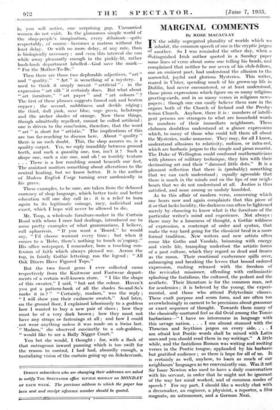MARGINAL COMMENTS
By ROSE MACAULAY
IN the oddly segregated plurality of worlds which we inhabit, the common speech of one is the cryptic jargon of another. So I was reminded the other day, when a distinguished Irish author quoted in a Sunday paper some lines of verse about some one telling his beads, and complained that neither he nor seven of his club-fellows, one an eminent poet, had understood the allusion to the sorrowful, joyful and glorious Mysteries. This writer, reared in Ulster, spending much of his grown-up life in Dublin, had never encountered, or at least understood, those pious expressions which figure on so many religious greeting-cards, and in so many verses in religious news- papers ; though one can easily believe them rare in the organs both of the Church of Ireland and the Presby- terian Church. Anyhow, there it is : numbers of intelli- gent persons are strangers to what are household words to numbers of their immediate neighbours. These clubmen doubtless understand at a glance expressions which, to many of those who could tell them all about the Mysteries, make nonsense. They may, for all I know, understand allusions to relativity, radium, or infra-red, which are barbaric jargon to the simple and pious rosarist. The Duke of Wellington could confound mathematicians with phrases of military technique, they him with their decimating art and their "damned little dots." It is a pleasant reflection that there is (probably) something that we can each understand ; equally agreeable that there is much in the minds and on the lips of our neigh- boues that we do not understand at all. Justice is thus satisfied, and none among us unduly humbled.
As to this affair of modern verse, concerning which one hears now and again complaints that this piece of it or that lacks lucidity, the darkness can often be lightened merely by chancing to know what is the furniture of the particular writer's mind and experience. Not always : there may be a looseness of thought, a Gothic wildness of expression, a contempt of order and syntax, that make the way hard going for the classicist bred in a more formal tradition. New writers and new artists often come like Goths and Vandals, brimming with energy and virile life, trampling underfoot the artistic forms of a past culture, which they regard as dead and frozen as the moon. Their emotional exuberance spills over, submerging and breaking the levees that bound ordered expression, rushing released with the freedom of the revivalist missioner, offending with enthusiastic splashing the fastidious, the cultured, the pedant and the aesthete. Their literature is for the common man, not for academics ; it is beloved by the young, the experi- mental, and those who attend Polytechnic classes. These exalt purpose and scorn form, and are often too overwhelmingly in earnest to be precisians about grammar or exact sequence of thought. Towards them many of the classically-nurtured feel as did Ovid among the Tomie barbarians—" I have no intercourse in language with this savage nation. . . . I am almost stunned with the Thracian and Scythian jargon on every side. . . . I am afraid lest Pontic words shall be mixed with Latin ones and you should read them in my writings." A little while, and the fastidious Roman was writing and reciting verses in the Pontic tongue, applauded by his barbaric but gratified audience ; so there is hope for all of us. It is certainly as well, anyhow, to learn as much of our neighbours' languages as we conveniently can. Was it not Sir Isaac Newton who used to have a daily conversation with his servant, in order that he might not be ignorant of the way her mind worked, and of common modes of speech ? For my part, I should like a weekly chat with a dressmaker, an engineer, a physicist, a reporter, a film magnate, an astronomer, and a German Nazi.,










































 Previous page
Previous page